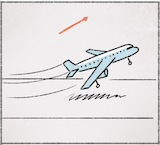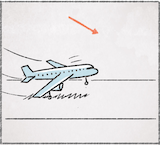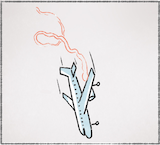


นี้คืออี่หยัง นี้คือเคี่ยงบิน
เคี่ยงบินมันกำลังเป็นหญัง เคี่ยงบินมันกำลังบินขึ้นฟ้า
เป็นหญังเคี่ยงบินมันกำลังสิบินขึ้นฟ้า บ่ลู้คือกัน เคี่ยงบินลำนี้อาดสิบินไปต่างปะเทดกะได้
เคี่ยงบินลำใหญ่บ่ ใหญ่อยู่ เคี่ยงบินลำใหญ่บักคัก
เคี่ยงบินมันบินเล็วบ่ บินเล็วอยู่ เคี่ยงบินมันบินเล็วบักคัก
เคี่ยงบินมันบินสูงบ่ สูงอยู่ เคี่ยงบินมันบินสูงหลาย
7
เคี่ยงบินมันกำลังเป็นหญัง เคี่ยงบินมันกำลังสิบินลงสู่พื้น
เป็นหญังเคี่ยงบินมันคือสิบินลงสู่พื้น มันอาดสิฮอดจุดหมายปายทางของมันแล้วกะได้ มันเลยบินลงสู่พื้น เพื่อที่สิจอดจุดหมายปายทางของมัน
เคี่ยงบินมันมาเล็วบ่ มาเล็วอยู่ เคี่ยงบินมันบินเล็ว มันกะเลยฮอดเล็ว
มันสิบ่คือลด ลดมันสิขี่ซ้า แล้วมันกะสิฮอดซ้า แต่อันนี้มันเป็นเคี่ยงบิน มันบินเล็ว มันกะสิฮอดเล็ว
8
เคี่ยงบินมันกำลังเป็นหญัง เคี่ยงบินมันกำลังสิตก มันสิตกสู่พื้น
เป็นหญังเคี่ยงบินมันคือสิตก บ่ลู้คือกัน มันอาดสิเกิดอุบะติเหดบางอย่าง อย่างเซ้น มีขี้ฝ้าหลาย ฝนตก หลืออาดสิเกิดเหดกานบางอย่างอยู่เทิงท้องฟ้า อยู่ในอากาดนั้นกะได้
ขั้นเคี่ยงบินตกแล้ว คนอยู่ในเคี่ยงบินสิเป็นอี่หยังบ่ กะเป็นอยู่ คนอยู่ในเคี่ยงบินกะอาดสิตายได้ เพาะว่ามันอันตะลาย เพาะว่าเคี่ยงบินมันตกจากเทิงฟ้าลงสู่พื้น กะอาดสิเฮ็ดให้ทุกคนอยู่ในเคี่ยงบินนั้นตายแล้วกะได้
Link to overview page
Link to dictionary
| Isaan | Pronunciation | Tones | Thai | English/Notes |
|---|---|---|---|---|
| นี้ | ni: | HF | นี้ | 1. this 2. here |
| คือ | khʉ: | HR | คือ | 1. to be, to resemble, like, as 2. why {บักหล้าคือบ่เก็บโต่ะแน่ = [addressing a young boy] Why haven't you cleared the table?} |
| อี่หยัง | i:-yaŋ | H-M | อะไร | 1. what {นี้คืออี่หยัง = What is this?} {มื้อนี้เจ้าเฮ็ดอี่หยัง = What are you doing today?} {กินเข้างายกับอี่หยัง = What did you have for breakfast?} 2. something, anything, (in negations) nothing {บ่ต้องเฮ็ดอี่หยังอีกเลยนอกจากใส่ปุย = [we] don't need to do anything besides adding fertilizer} |
| เคี่ยงบิน | khi:aŋ-bin | H-M | เครื่องบิน | airplane |
| มัน | man | HR | มัน | it (also used to refer to people) |
| กำลัง | gam-laŋ | M-HR | กำลัง | auxiliary indicating continuous or progressive action |
| เป็น | pen | M | เป็น | 1. to be, to exist 2. to be able to 3. to suffer, sth. happens to 4. เป็นหญัง[...]คือ in initial position: why? {เป็นหญังเขากะคือแปงฟัน = Why is he brushing his teeth?} {เป็นหญังเคี่ยงบินมันคือสิตก = Why is the airplane falling down?} |
| หญัง | ɲaŋ | M | อะไร, เป็นหญัง = ทำไม | 1. what {เขากำลังเฮ็ดหญัง = What is he doing?} {ธูปเอาไว้เฮ็ดหญัง = What are incense sticks for?} 2. something, anything, (nothing) 3. เป็นหญัง[...]คือ in initial position: why {เป็นหญังเขาคือใส่บักพิกลงไปในกวยเตียว = Why is he putting chili in [his] noodle soup?} {เป็นหญังหน้าต่างมันคือเปิด = Why is the window open?} {เป็นหญังมันคือมีควนไฟ = Why is there smoke?} |
| บิน | bin | M | บิน | to fly |
| ขึ้น | khʉn | LF | ขึ้น | 1. to go up, to increase 2. sun: to rise {ตะเว็นกำลังขึ้น = the sun is rising} 3. more 4. bus/train etc.: to get on, to board {พุโดยสานขึ้นลดไฟเบิดแล้ว = all passengers have boarded the train} |
| ฟ้า | fa: | HF | ฟ้า | 1. sky {เคี่ยงบินมันกำลังบินขึ้นฟ้า = the airplane is taking off into the sky} 2. color: blue |
| สิ | si | M | จะ | future tense auxiliary {เขากำลังสิตื่น = he's about to wake up} {สิไปตะหลาด = [I'm] going to the market} |
| บ่ | bɔ: | H | ไม่ | 1. no, not 2. question particle, transforming a statement into a question Notes: spelling exception in line with common usage on social media |
| ลู้ | lu: | HF | รู้ | 1. to know 2. to understand Notes: equivalent to ฮู้ |
| คือกัน | khʉ:-gan | HR-M | เหมือนกัน | 1. also, likewise, similarly {ยินดีที่ได้ฮู้จักคือกันคับ = Nice to meet you too!} 2. in negative sentences: either {บ่ลู้คือกัน = I don't know either} {จักคือกัน = I don't know (either)} |
| ลำ | lam | HR | ลำ | clf. for airplanes, boats, tree trunks |
| อาด | a:t | LF | อาจ | 1. might, may, will 2. likely |
| ไป | pai | M | ไป | 1. to go 2. auxiliary indicating action extending into the future |
| ต่างปะเทด | ta:ŋ-pa-thet | H-M-HF | ต่างประเทศ | foreign country |
| กะ | ga | M | ก็ | 1. then, consequently 2. also |
| ได้ | dai | HF | ได้ | 1. can 2. to get, to obtain 3. before verb: indicating past tense 4. บ่ได้ + verb: not |
| ใหญ่ | ɲai | H | ใหญ่ | large, big |
| อยู่ | yu: | H | อยู่ | 1. to be (located) at 2. yet, still 3. auxiliary indicating continuous or progressive action {ทอดปาอยู่ในกะทะ = (in the process of) frying a fish in the pan} {แม่กำลังเมี้ยนเฮียนอยู่ = mother is cleaning/tidying up the house} |
| บักคัก | bak-khak | M-H | intensifier: very, very much (variant of คัก) | |
| เล็ว | leo | HR | เร็ว | fast, quick |
| สูง | su:ŋ | M | สูง | high, tall |
| หลาย | la:i | M | เยอะ, มาก | many, much, very |
| ลง | loŋ | HR | ลง | 1. to descend, to lower, to go down 2. down 3. bus/train etc.: to get off, to disembark {คนกำลังลงลดบั่ด = people are getting off the bus} 4. boat/ship etc.: to get on, to board {เขากำลังญ่างลงเลีย = he's boarding/getting on the boat} |
| สู่ | su: | H | สู่ | to, towards {เคี่ยงบินมันกำลังสิตกสู่พื้น = the plane is falling down} {เซี้ยโลกเข้ามาสู่ล้างกาย = germs are getting into the body} |
| พื้น | phʉ:n | HF | พื้น | 1. floor, ground 2. surface, area {หล่นลงไปลงพื้น = [it] falls to the ground} {เขานั่งอยู่เทิงพื้น = he's sitting on the floor} |
| ฮอด | hɔ:t | HF | ถึง | 1. to arrive, to attain {ฮอดจุดหมายปายทาง = (airplane, train etc.) to arrive at one's destination} {มันทันได้ฮอดหกโมงอยู่ = it's not yet 6 o'clock} 2. to, at {ผมญาวฮอดบ่าไหล่เอาโลด = long hair down to the shoulders} 3. about {บ่ได้เว้าฮอด = [I] haven't talked about [this]} {คนที่เฮาเว้าฮอดวั่งหั้นหละ = the person we've just talked about} |
| จุดหมาย | jut-ma:i | M-M | จุดหมาย | destination, goal, aim, objective |
| ปายทาง | pa:i-tha:ŋ | M-HR | ปลายทาง | destination, end of a journey |
| ของ | khɔ:ŋ | M | ของ | of, belonging to |
| แล้ว | lɛ:o | HF | แล้ว | 1. finished 2. already 3. and then, and next (especially แล้วกะ) 4. auxiliary for past tense |
| เลย | lə:i | HR | เลย | 1. futher on, beyond, past {เข็มน้อยเลยเลขสิบสองไป = the minute hand has passed number twelve} 2. too much 3. at all 4. definitively 5. completely, utterly |
| เพื่อที่ | phʉ:a-thi: | H-H | เพื่อที่ | in order to, so that Notes: the vowel เอือ is likely to be a Thai loan |
| จอด | jɔ:t | LF | จอด | to park, to stop |
| มา | ma: | HR | มา | 1. to come 2. auxiliary expressing action towards the present or focal time {กะคุเฮ็ดมาจากอี่หยัง = What is the bucket made of?} {แล้วเขากะเก็บเงินจากพุนั้นมา = and then she takes the money of that person} |
| ลด | lot | H | รถ | 1. car, motorized vehicle 2. vehicle, cart {ลดขายแนวกิน = food cart} |
| ขี่ | khi: | H | ขี่ | to ride, to drive {ขี่มอเตอไซ = to ride a motorbike} {ขี่ควย = to ride on a buffalo} {ขี่เลีย = to take or travel on a boat} |
| ซ้า | sa: | HF | ช้า | 1. slow 2. late, delayed |
| แต่ | tɛ: | H | แต่ | 1. but {แต่บ่ต่างกันหลาย = but not very different} {แต่บ่ลู้ว่าเขาญ่างมาแต่ใส = but [I] don't know where he's coming from, see also: แต่ว่า} 2. only {ตอนนี้มีแต่ขี้ฝ้า = now there are only clouds} |
| อัน | an | M | อัน | 1. thing, object 2. general clf. for objects |
| ตก | tok | M | ตก | 1. to fall, to drop 2. sun: to set {ตะเว็นตกดิน = the sun is setting} |
| เกิด | gə:t | LF | เกิด | 1. (often together with ขึ้น) to happen, to arise, to take place {เกิดอี่หยังขึ้น = what is happening?} {บ่มีหญังเกิดขึ้น = nothing's happening} 2. to be born 3. to grow {หนวดกะคือสิเกิดอยู่ใต้ดัง = a moustache grows below the nose} |
| อุบะติเหด | u-ba-ti-he:t | M-M-M-LF | อุบัติเหตุ | accident |
| บาง | ba:ŋ | M | บาง | 1. some {สัดบางโตบ่มีขา = some animals don't have legs} {บางคนสิมักกินกวยเตียวแทนเข้า = some people like to eat noodle soup instead of rice (dishes)} {บางสิ่งบางอย่าง = something, anything} 2. thin |
| อย่าง | ya:ŋ | H | อย่าง | type, kind, sort, category |
| อย่างเซ้น | ya:ŋ-sen | H-HF | อย่างเช่น | for example, such as, like Notes: pronunciation: also realized as อย่างเช้น |
| มี | mi: | HR | มี | 1. to have 2. there is |
| ขี้ฝ้า | khi:-fa: | LF-LF | เมฆ | cloud {ขี้ฝ้ามีหลายอยู่ ขี้ฝ้ามันมีเต็มท้องฟ้าอยู่ = there are many clouds, there are clouds all over the sky} |
| ฝน | fon | M | ฝน | rain |
| หลือ | lʉ: | M | หรือ | or |
| เหดกาน | he:t-ga:n | LF-M | เหตุการณ์ | event, incident |
| เทิง | thə:ŋ | HR | บน | 1. on, on top of, at, in {เทิงโต่ะ = at/on the table} {กบมันนั่งอยู่เทิงใบบัว = the frog is sitting on the lotus leaf} {เทิงท้องฟ้า = in the sky} {มันแล่นอยู่เทิงลาง = [the train] runs on rails} {มีคนนั่งอยู่เทิงลดสามล้อสามคน = there are three people sitting in the tuk tuk} 2. up, upward Notes: pronunciation: also realized as ทัง |
| ท้องฟ้า | thɔ:ŋ-fa: | HF-HF | ท้องฟ้า | sky |
| ใน | nai | HR | ใน | in, within |
| อากาด | a:-ga:t | M-LF | อากาศ | 1. weather, climate 2. air |
| นั้น | nan | HF | นั้น | that, there |
| ขั้น | khan | LF | เมื่อ | when, if |
| คน | khon | HR | คน | person, people |
| ตาย | ta:i | M | ตาย | to die |
| เพาะว่า | phɔ-wa: | H-H | เพราะว่า | because |
| อันตะลาย | an-ta-la:i | M-M-HR | อันตราย | 1. danger 2. dangerous |
| จาก | ja:k | LF | จาก | 1. from {... เฮ็ดมาจากอี่หยัง = ... is made from what?} 2. to depart |
| เฮ็ด | het | H | ทำ | to do, to make |
| ให้ | hai | LF | ให้ | 1. to give {หมอกำลังเอายาให้คนป่วยกิน = the doctor is giving the patient medicine} 2. for 3. to allow, to be allowed |
| ทุก | thuk | H | ทุก | every Notes: also pronounced ทุ as in ทุมื้อๆ = everyday, always |